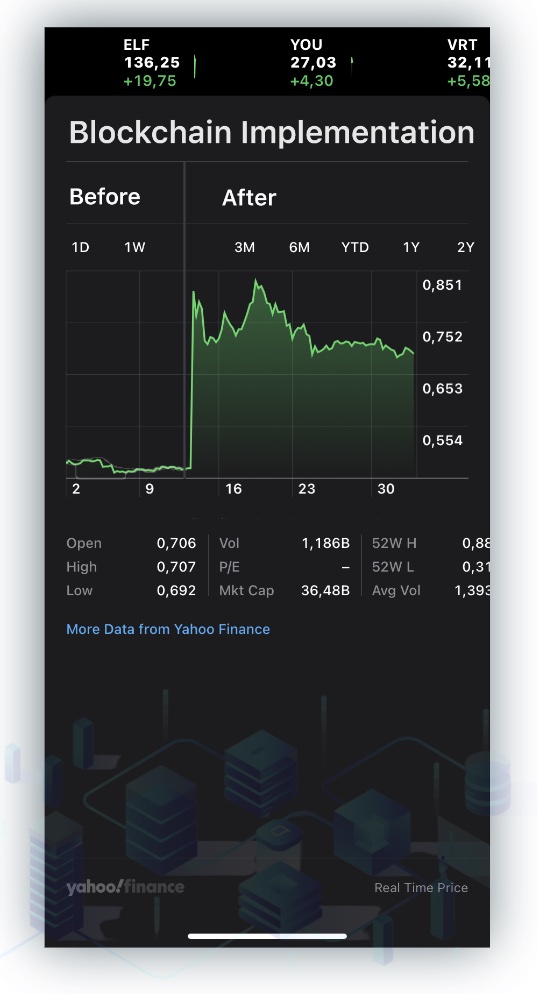Introduction
Great potential for blockchain adoption in business.
Blockchain technology has gained immense popularity, primarily driven by the rise of cryptocurrencies.
Governments of developed nations and tech giants like Google, Facebook, and Microsoft have recognized the transformative power of blockchain, investing heavily in its development. According to Accenture, a leading consulting firm, blockchain is expected to become an integral part of the global economy by 2025-2030.
Many businesses are still grappling with how to harness the potential of blockchain and integrate it effectively into their operations. This is precisely the question we aim to address in this guide.
Join us as we demystify blockchain technology and explore its practical applications for businesses.
What Is a Blockchain?
Transaction confirmation strength
Blockchain is a distributed database that contains information about all transactions conducted by blockchain participants. The information is stored as a chain of blocks. In order to understand the essence, let us give an associative example.
For example, you have 6 friends. They all work in the market. They have a common cause (network) – they trade goods. But they have no money. But there are some paper receipts (transactions) on which they write the amount of payment for goods. They sign the receipts and then give them to each other as payment for the products.
Of course, at some point, there is a desire to add a zero to the number written by the hand of a friend. And so that this does not happen, when transferring the receipt, at least 6 community members sign on the sheet, and they also make a scan copy of this receipt and keep it. Thus, it is impossible to forge and add zeros to the amount. This is the essence of blockchain. The main goal is the security of transactions.
Seven Steps to Implement Blockchain Technology
Essential steps will help simplify the process
- Identify the use case, and if a blockchain is necessary or if a centralized platform makes more sense.
- Create a proof of concept.
- Choose a blockchain platform and along with this, the right consensus protocol and overall architecture.
- Select a contractor for blockchain integration.
- Develop a concept for integrating blockchain into the company’s business processes.
- Develop smart contracts.
- Maintain and update the network.
Each step is integral to the blockchain technology integration.
Of course, at some point, there is a desire to add a zero to the number written by the hand of a friend. And so that this does not happen, when transferring the receipt, at least 6 community members sign on the sheet, and they also make a scan copy of this receipt and keep it. Thus, it is impossible to forge and add zeros to the amount. This is the essence of blockchain. The main goal is the security of transactions.
Implementing Blockchain: Key Considerations
There are various considerations when implementing blockchain technology in any organization.
- Scalability: Ensuring the ability to scale the blockchain to support a growing volume of transactions and users.
- Security: Guaranteeing a high level of data and asset security on the blockchain, protecting against unauthorized access and fraud.
- Governance: Establishing effective governance mechanisms for the blockchain, including decision-making processes, network rule changes, and access regulation.
- Compatibility with Ethereum Virtual Machine (EVM): Ensuring compatibility with existing smart contracts and applications developed for the Ethereum platform.
- Decentralization: Designing and maintaining a decentralized network where participants have equal rights and opportunities.
- Existing dApps on the blockchain: Taking into account existing decentralized applications that can be integrated or interact with the new blockchain.
- Integration with other systems: Establishing connections and compatibility with existing information systems and organizational infrastructure.
- Compliance with legal regulations: Adhering to requirements and restrictions set by legislation and regulatory bodies to ensure compliance with rules and norms.
- Community acceptance: Considering the opinions and expectations of the user community, developers, and other stakeholders.
- Developer adoption: Providing sufficient resources, documentation, and tools for developers to successfully build applications on the blockchain.
Implementing blockchain technology in business requires significant changes and should not be taken lightly. When preparing for such a change, it is essential to take into account all the aspects mentioned above.
Key Aspects of Blockchain Technology
Decentralization.
Decentralization plays a crucial role in blockchain technology, as it ensures that no single entity has the authority to make decisions or control the entire network.
Immutability.
The immutability of blockchain stems from the fact that once data is recorded on the blockchain ledger, it becomes unalterable.
Privacy Constraints.
The level of privacy in blockchain can be perceived both as an advantage and a drawback, depending on the context.
Scalability Challenges.
Scalability is a widely discussed topic in the realm of blockchain technology, focusing on the ability to handle increased transaction volume and network growth.
Integration.
Ability to integrate with virtually any type of business. Blockchain makes it possible to tokenize the production of goods, real estate, and commodity.
Advantages of Blockchain for Business
From Theory to Practice
The benefits of blockchain, including its immutability, transparency, traceability, and freedom from centralized governance, offer significant advantages for businesses.
When considering implementing blockchain in your organization, it is crucial to determine its specific use cases and the problems it will address. This will enable you to set clear goals and develop comprehensive plans.
To identify the most promising applications for your company, you can initiate and evaluate several pilot projects.
For example, you could explore issuing your own NFTs (Non-Fungible Tokens) or creating tokens tied to the value of your commodities, such as gold or aluminum. These experiments will provide valuable insights and inform your future strategies. All this can be called in one word – tokenization. Let’s look at the advantages of tokenization for companies.
Challenges in Business — Proactive Solutions
Most companies are always facing major challenges, including:

Solving these problems can help companies save millions of dollars.
There are examples where tokenization solutions have enabled companies to raise over $130,000,000 of capital and create sustainable revenue streams.
At this stage, you can start a consultation with Core State Holdings experts, who have extensive experience in developing blockchain solutions.
Collaboration With Top-Tier
Companies Showcases Our Impact
Problems | Solution | Result |
|
| The company generated revenue in the millions and saw a minimum 10x increase in their initial ROI. |

Core State Holdings, Corp.
The only software development firm in North America actively engaging with commodity and mining companies in the blockchain/Web 3.0 business.
We partner with top-tier gold, silver, aluminum and other commodity/miners, helping them generate unprecedented capital through smart contracts for commodity-backed tokens.
The various industries that we serve: Technology, Retail, Real Estate, Banking, Entertainment, Maritime, Mining, Blockchain, Telecommunications, Agriculture, and many more…
Having studied your business processes, we can make recommendations that will help you avoid unnecessary costs later on.



